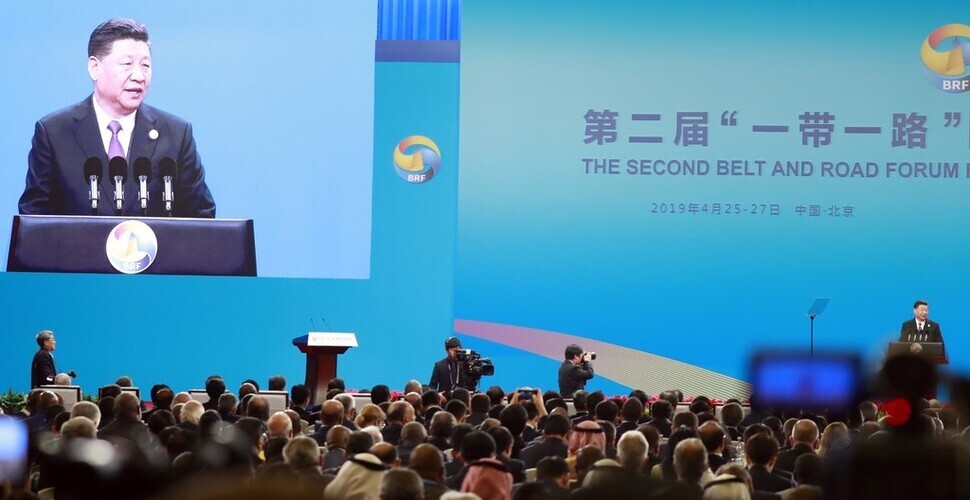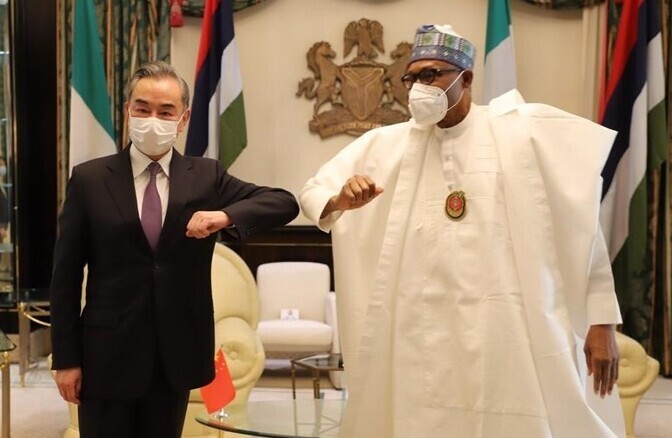hankyoreh
Links to other country sites 다른 나라 사이트 링크
African youth now think more fondly of China than US, survey shows

China has edged out the US for first place when it comes to influence and favorability in the minds of young Africans, a survey has found. When the same survey was conducted two years ago, the US had led China in favorability, but that result was flipped in the latest poll. It appears that the Belt and Road Initiative, the overseas expansion policy that China launched in 2013, is getting results, despite various controversies surrounding it.
China leads US in both influence and favorability two years after previous surveyThe African Youth Survey 2022, the findings of which the South African-based Ichikowitz Family Foundation published on Monday, found that China is considered the country with the biggest impact on Africa, with 77% of respondents identifying China as influential. The US came in second in that category, at 67%.
The survey found a 10-point gap in impact between the two countries, up from the 5-point gap two years ago, when China was at 79% and the US was at 74%. Both countries’ influence declined during that period, but that of the US fell much further.
This survey polled 4,507 young people (aged 18-24) in 15 countries across Africa.
China also outperformed the US in favorable assessments. Seventy-six percent of the young African respondents named China as having a positive influence in Africa, putting the country in third place after the African Union (AU, 82%) and the Republic of South Africa (80%). In contrast, 72% of respondents named the US, ranking it lower than the European Union (74%) and the UK (75%) as well.
A previous survey in 2020 showed 83% of respondents rating the US as favorable, ahead of 79% for China. Two years later, their positions have now been reversed. In particular, 35% of respondents this time said China was having a “very” positive influence in Africa, compared with 26% who characterized the US’ influence as “very” positive.
In an interview with Bloomberg, the foundation’s chairman, Ivor Ichikowitz, said, “We see China having climbed to pole position, we see a recognition of the fact that China is engaging in Africa at a time when very few others are.”
“In Africa, America has played [. . .] an embarrassingly insignificant role in terms of actual investment, actual trade, actual building of infrastructure,” he added.

An analysis of the concrete aspects of Chinese influence showed mixed attitudes toward China among countries in Africa.
Forty-four percent of respondents who rated China’s influence favorably cited the affordability of Chinese products. Investment and support for social infrastructure was the next most frequently cited factor at 41%, while the creation of jobs in Africa came in third at 35%. Other important factors included state loans and economic support (29%) and export market availability (17%).
In summary, the major reasons for positive ratings of China had to do with its cost-competitive products — including smartphones, clothing and automobiles — and the Chinese government’s proactive investment in and support for Africa.
In contrast, 36% of those who rated China negatively argued that it takes Africa’s resources without paying a fair price for them. Other factors cited included Chinese workers taking African jobs away from Africans (24%) and fears that Chinese investment might translate into economic colonialism (24%). Additional reasons included a lack of respect for Africa (21%) and difficulties repaying Chinese loans (21%).
The results offered a glimpse at some of the side effects of China’s proactive investment in Africa, along with the true nature of China’s assistance to Africa.
Side effects deepen since 2013 launch of Belt and Road expansionThe beginning of China’s active investment in Africa came in 2013 when President Xi Jinping announced the expansion-oriented Belt and Road Initiative as a key component of Beijing’s foreign affairs policy.
The vision involved China expanding westward and southward through overland and sea routes into Southeast Asia, Central Asia, Africa, and Europe. The objectives included finding outlets for China’s unused capital and workforce while expanding influence in regions that were being neglected by the US and other Western countries.
More concretely, it has involved lending Chinese funds to developing and underdeveloped countries while sending in Chinese companies and workers to build social infrastructure, including highways, bridges, and ports. The project has been actively welcomed by Kenya, Ethiopia, Tanzania, and other African countries short of their own funds.
But some critics have disparaged the approach as “debt-trap diplomacy” by China, with some of the countries struggling with mounting debts or finding themselves unable to repay existing ones.
By Choi Hyun-june, Beijing correspondent
Please direct questions or comments to [english@hani.co.kr]

Editorial・opinion
![[Column] Has Korea, too, crossed the Rubicon on China? [Column] Has Korea, too, crossed the Rubicon on China?](https://flexible.img.hani.co.kr/flexible/normal/500/300/imgdb/original/2024/0419/9317135153409185.jpg) [Column] Has Korea, too, crossed the Rubicon on China?
[Column] Has Korea, too, crossed the Rubicon on China?![[Correspondent’s column] In Japan’s alliance with US, echoes of its past alliances with UK [Correspondent’s column] In Japan’s alliance with US, echoes of its past alliances with UK](https://flexible.img.hani.co.kr/flexible/normal/500/300/imgdb/original/2024/0419/2317135166563519.jpg) [Correspondent’s column] In Japan’s alliance with US, echoes of its past alliances with UK
[Correspondent’s column] In Japan’s alliance with US, echoes of its past alliances with UK- [Editorial] Does Yoon think the Korean public is wrong?
- [Editorial] As it bolsters its alliance with US, Japan must be accountable for past
- [Guest essay] Amending the Constitution is Yoon’s key to leaving office in public’s good graces
- [Editorial] 10 years on, lessons of Sewol tragedy must never be forgotten
- [Column] A death blow to Korea’s prosecutor politics
- [Correspondent’s column] The US and the end of Japanese pacifism
- [Guest essay] How Korea turned its trainee doctors into monsters
- [Guest essay] As someone who helped forge Seoul-Moscow ties, their status today troubles me
Most viewed articles
- 1[Column] The clock is ticking for Korea’s first lady
- 2Samsung barricades office as unionized workers strike for better conditions
- 3[Editorial] When the choice is kids or career, Korea will never overcome birth rate woes
- 4S. Korea, Japan reaffirm commitment to strengthening trilateral ties with US
- 5[News analysis] After elections, prosecutorial reform will likely make legislative agenda
- 6Japan officially says compensation of Korean forced laborers isn’t its responsibility
- 7[Editorial] As it bolsters its alliance with US, Japan must be accountable for past
- 8[Editorial] Does Yoon think the Korean public is wrong?
- 9Why Israel isn’t hitting Iran with immediate retaliation
- 10[Interview] Learning about the Sewol tragedy through BTS